(完整)人教版高中英语必修一Unit5语法知识
人教版高中英语必修一:Unit 5 Nelson Mandela - a modern hero Words and expressions课件(共25张PPT)

Period 1 Words and expressions
Aims:
1.Ability aims: 1). Master the floowing words and expressions. quality; active; mean; generous; devote; fight; found; equal; principle; vote; attack ; etc 2). To Know about the following phrases: out of work; in trouble; blow up; as a matter of fact; turn to 2. Knowledge aims quality; active; mean; generous; devote; fight; found; equal; principle; vote; attack ; etc
4. generous a. 慷慨的;大方的
be generous with sth不吝啬某物 e.g. He is generous with his time.
be generous of sb to do sth It was generous of her to contribute so much money. be generous in doing sth be generous to sb
5.devote vt.(与to 连用)献身,专心于 _________adj 忠实的,深爱着的 devoted _________n. devotion 奉献 ___________ [搭配]把……用在/献给…… devote ... to ... be devoted to ___________ [搭配]专心于,忠诚于
人教版英语必修一Unit5词汇
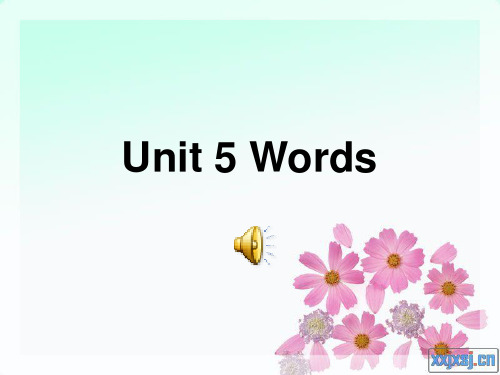
【拓展】
out of breath out of use out of order out of control out of danger out of sight out of date 上气不接下气 没用了 出故障了 失控了 脱离危险了 看不见了 过时
• vote • (1) 投票;表决 • Congress voted to increase foreign aid by 10%. • (2) n. [C] 投票,表决 • The result of the vote were surprising. • 拓展: • vote to do sth 投票做某事 • vote for sb 投票支持某人 • vote against sb 投票反对
• • • • • • • • •
(3)adj. 熟练的;出色的 搭配: be no mean 了不起,很出色 He is a mean tennis player. His mother was a painter, and he is no mean artist himself. (4) vt. 意思是;意味着;表示……意思 搭配: mean to do sth 打算做某事 mean doing sth 意味着;意思是 But I didn’t mean to hurt you. Missing the bus means walking home.
Unit 5 Words
• • • • • • •
quality n. (1) [U,C]质,质量,品质 Quality is more important that quantity. (2)[C]性质,特性,特点 One quality of wood is that it can burn. (3)[C]品德,品性 You need some special personal qualities to work as a nurse.
英语人教版高中必修一 教案Unit 5 Discovering Useful Structures

Unit 5 Languages Around the WorldPeriod 3 Discovering Useful Structures教材分析本节课为语法课,主题为“描述你喜欢的事物”(Describe your favorite things)。
教学内容为限制性定语从句和关系副词when,where,why,介词+which的用法。
首先,通过观察上一课时“Reading and Thinking”课文中出现的句子,要求学生归纳限制性定语从句中关系副词的用法。
接着,通过完成单句填空、语篇填空等练习帮助学生更加熟练地掌握限制性定语从句中关系副词的用法。
最后,通过真实语境,进行语言输出。
利用定语从句准确表达自己的喜好,描述最喜欢的人、物、时间、地点、原因等。
教学目标在本课学习结束时,学生能够:1. 观察和归纳限制性定语从句中关系副词when,where,why,介词+which的用法。
2. 运用定语从句的语法知识,理解语境、语篇意义。
3. 运用定语从句表达看法和描述喜好。
教学重难点【教学重点】1. 掌握限制性定语从句中关系词的用法。
2. 理解含有限制性定语从句的语篇。
【教学难点】运用定语从句,准确描述喜好。
教学过程Step 1 Warming-up1. When does written Chinese language date back to?2. What is longgu?Step 2 ObservingRead the sentences from the passage and underline the restrictive clauses.设计意图:学生观察句子,复习限制性定语从句,找到由关系副词引导的限制性定语从句。
Step 3 Grammar SummaryRead the grammar notes on P110 and P111.设计意图:讲解课后P110-P111的语法要点,学习关系副词引导的限制性定语从句。
人教版高中英语必修1知识点汇总(一册全)
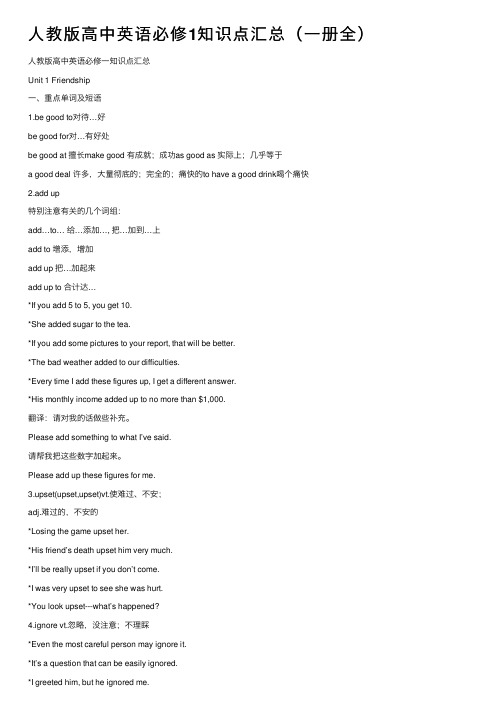
⼈教版⾼中英语必修1知识点汇总(⼀册全)⼈教版⾼中英语必修⼀知识点汇总Unit 1 Friendship⼀、重点单词及短语1.be good to对待…好be good for对…有好处be good at 擅长make good 有成就;成功as good as 实际上;⼏乎等于a good deal 许多,⼤量彻底的;完全的;痛快的to have a good drink喝个痛快2.add up特别注意有关的⼏个词组:add…to… 给…添加…, 把…加到…上add to 增添,增加add up 把…加起来add up to 合计达…*If you add 5 to 5, you get 10.*She added sugar to the tea.*If you add some pictures to your report, that will be better.*The bad weather added to our difficulties.*Every time I add these figures up, I get a different answer.*His monthly income added up to no more than $1,000.翻译:请对我的话做些补充。
Please add something to what I’ve said.请帮我把这些数字加起来。
Please add up these figures for me.3.upset(upset,upset)vt.使难过、不安;adj.难过的,不安的*Losing the game upset her.*His friend’s death upset him very much.*I’ll be really upset if you don’t come.*I was very upset to see she was hurt.*You look upset---what’s happened?4.ignore vt.忽略,没注意;不理睬*Even the most careful person may ignore it.*It’s a question that can be easily ignored.*I greeted him, but he ignored me.5.calm adj.平静的,镇静的;风平浪静的vt.使平静*After the storm, the sea was calm again.*Keep calm in time of danger.*Don’t be nervous; calm yourself, please.calm down平静下来*I told him to calm down.6.concern vt.关系到,和…有关;使关⼼*This matter concerns all of us.*I’m not concerned with this matter again.be concerned about关⼼…;为…担⼼*Please don’t be concerned about me.7.go through 经历,经受;审阅,检查*Most families went through a lot during the war. *I can’t go through these letters in an hour.8. “make her diary her best friend”“call my friend Kitty”make和call都能以名词作宾语补⾜语,即make+sb./sth.+n. 使某⼈/某物成为…call+sb./sth.+n. 称某⼈/某物为…*We must try to make our country a strong one.*All work and no play makes Jack a dull boy.*We called messenger msn in short.*What do you call it?9.everything to do with naturesomething/anything/everything/nothing to do with 与…有关/⽆关*What he is doing has nothing to do with his work.10.far too much实在太多too much(+n.)太多(…), 超过某⼈的能⼒far/much too+adj./adv.实在太…too much homeworkThe work is too much for a boy like him.It’s (much/far) too hot todaymuch/ far too much实在太多11.suffer vi.受苦,受痛苦,受损失vt.受到,遭受*He suffered terribly when his mother died.*He looked pale, and seemed to have suffered a lot/a great deal. *We suffered a set-back/no pain. suffer from遭受,患(病)*I suffered much from lack of rest.suffer from cold/cancer12.recover vt.恢复vi.痊愈*She recovered her health.*Amy is recovering from a severe illness.*He is unlikely to recover.13.get tired of对…开始感到厌烦(表动作)be tired of对…感到厌烦(表状态)14.get along with和…相处;进展*They get along quite well with each other.*How are you getting along with your classmates?*How are you getting along with your English?*I’m getting along well with my study.15.exactly adv.确切地;正是;说的对*You must tell me exactly what you’re doing?*That’s exactly what I want.*It looks exactly like an elephant’s leg.*Exactly!(=That’s right.)16.grateful adj.感激的*I’m very grateful to you for your advice.=Thank you very much for your advice.17.joinA.参加,加⼊(成为其中的成员)*He joined the army/the Party 3 years ago.*He is too young to join the club.B.join sb.和某⼈⼀起(从事某活动)*Will you join us for dinner?*I’ll join you later.*May I join you in the game?C.join in参加某活动(=take part in)*A lot of newcomers joined in the discussion.*May I join in the game?⼆、重点句型1. Do you want a friend whom you could tell everything to, like your deepest feelings and thoughts?2. I wonder if it’s because I haven’t been able to be outdoors for so long that I’ve grown so crazy about everything to do with nature.3. I can well remember that there was a time when a deep blue sky, the song of the birds, moonlight and flowers could never have kept me spellbound.4. It’s no pleasure looking through these any longer because nature is one thing that really must be experienced.5. It/This/That is the first /second…time that+现在完成时“某⼈第⼀/⼆次做……”eg. It is the first time that I have been to the airport.It/This/That was the first / second…timethat+过去完成时eg. It was the second time that I had seen him.三、语法语法----直接引语和间接引语概念:直接引语:直接引述别⼈的原话。
人教版(2019)新教材高中英语必修第一册第五单元词汇学习PPT
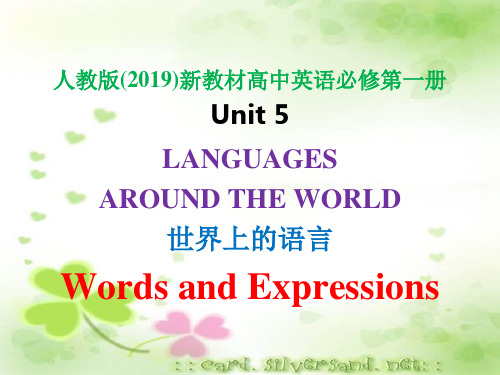
your bones as well.
14. shell [ʃel]: n.壳; 壳状物 The girl likes to look for shells on the
seashore.
15. symbol [ˈsɪmbl ]: n. 符号;象征 1)In China, the dragon is a symbol of
4. reference [ˈrefrəns]: n.指称关系;参考 Reference News: 参考消息 (中国报纸名)
1)These reference books are necessary to us.
2)This article can be read for reference.
5. refer [rɪˈfɜ:(r) ]: v. 提到;参考;
2)He is a man of fine character. 3)The man is a major character in the film. 4) The biggest character is that it can
by Mo Yan. 3)The novel is based on a true story. 4)Your grade will be based on three
papers and a final exam.
11. base [beɪs ]: n.底部;根据;基础
v.以...为据点/基础
base...on/upon...:以...为基础/根据 1)The scientist based his ideas on
个性强 /不强
Unit 5 语法专题 定语从句(2)关系副词选择技巧学案 人教版 2019 必修第一册
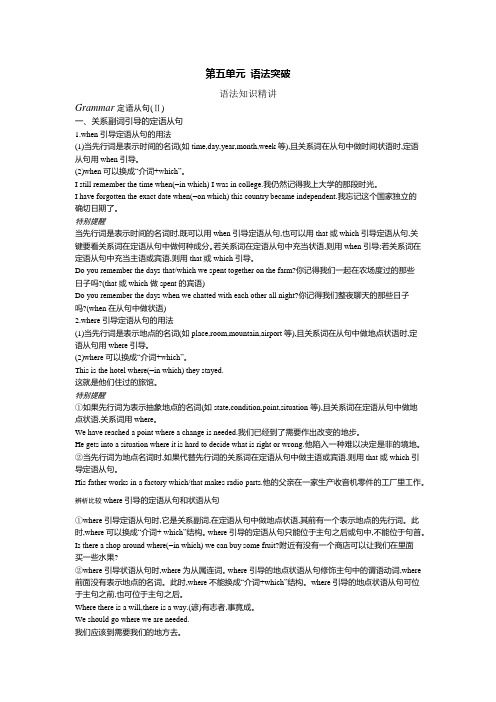
第五单元语法突破语法知识精讲Grammar定语从句(Ⅱ)一、关系副词引导的定语从句1.when引导定语从句的用法(1)当先行词是表示时间的名词(如time,day,year,month,week等),且关系词在从句中做时间状语时,定语从句用when引导。
(2)when可以换成“介词+which”。
I still remember the time when(=in which) I was in college.我仍然记得我上大学的那段时光。
I have forgotten the exact date when(=on which) this country became independent.我忘记这个国家独立的确切日期了。
特别提醒当先行词是表示时间的名词时,既可以用when引导定语从句,也可以用that或which引导定语从句,关键要看关系词在定语从句中做何种成分。
若关系词在定语从句中充当状语,则用when引导;若关系词在定语从句中充当主语或宾语,则用that或which引导。
Do you remember the days that/which we spent together on the farm?你记得我们一起在农场度过的那些日子吗?(that或which做spent的宾语)Do you remember the days when we chatted with each other all night?你记得我们整夜聊天的那些日子吗?(when在从句中做状语)2.where引导定语从句的用法(1)当先行词是表示地点的名词(如place,room,mountain,airport等),且关系词在从句中做地点状语时,定语从句用where引导。
(2)where可以换成“介词+which”。
This is the hotel where(=in which) they stayed.这就是他们住过的旅馆。
Unit 5 Language points 课件-高中英语人教版(2019)选择性必修第一册
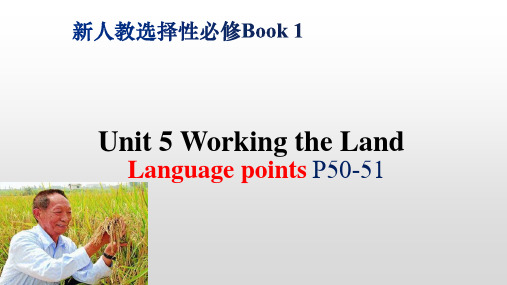
词汇精讲 句型剖析
课前•基础认知 课堂•重难突破
学以致用 单句语法填空 (1)She gives the impression of being generous,but in reality (real) she is a very selfish girl. (2)I didn’t realise (real) that you were not happy.
词汇精讲 句型剖析
课前•基础认知 课堂•重难突破
语境领悟 (1)Given his age,he is very strong and healthy. 考虑到他的年龄,他已经非常强壮健康了。 (2)Given that the students need more exercise,the head teacher has decided to add more PE classes. 考虑到学生们需要更多的锻炼,校长已决定增加更多体 育课。
vt.出产(作物);产生(收益、效益等) yield to sb/(doing) sth 屈服于某人/做某事 yield sth/sb up (to sb)放弃
课前•基础认知 课堂•重难突破
词汇精讲 句型剖析
学以致用 单句语法填空 (1)It’s polite to yield up your seat to an old lady on the
replace his old one. (3)There is a possibility of severe water shortages (short)
in the foreseeable future. (4) Shortly (short) after he left the bus station,came a
人教版(2019)高中英语必修第一册Unit 5 Languages Around the World 课件
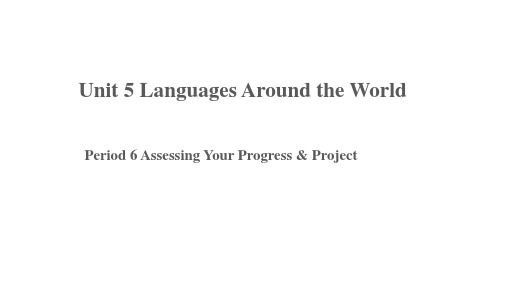
Revision of words
Fill in the blanks with the correct form of the words and phrases. 5) He spent most of his professional life outside his _n_a_t_iv_e__ Poland. 6) Some people think that nuclear war would mean the end of human _c_iv_i_li_s_a_ti_o_n_. 7) Light industry _is_ closely _r_e_la_t_e_d_t_o_ agriculture. 8) From a medical _p_o__in_t_o_f_v_i_e_w__, there was no need for the operation.
Practice
Read the second part of the passage and combine the words in the two boxes to complete the restrictive clauses.
building class day way someone when in which where who that
Practice
Read the first part of a passage and find suitable words for the blanks.
attitude despite
classic native
point of view related to
civilisation struggle
Revision of structures
- 1、下载文档前请自行甄别文档内容的完整性,平台不提供额外的编辑、内容补充、找答案等附加服务。
- 2、"仅部分预览"的文档,不可在线预览部分如存在完整性等问题,可反馈申请退款(可完整预览的文档不适用该条件!)。
- 3、如文档侵犯您的权益,请联系客服反馈,我们会尽快为您处理(人工客服工作时间:9:00-18:30)。
Grammar
The Attributive Clause Ⅱ
关系副词where
This is the factory. I worked in the factory ten years ago.
→This is the factory where I worked ten years ago.
The school is near a park. My son studies in this school.
→The school where my son studies is near a park.
We visited the house. Lusun once lived in the house.
→We visited the house where Lusun once lived.
关系副词when
They’ll never forget July 1. Hong Kong returned to its motherland on July 1.
→They’ll never forget July 1 when Hong Kong returned to its motherland.
The days are gone forever. We used foreign oil during those days.
→The days when we used foreign oil are gone forever.
There was a time. The businessman lost heart at that time.
→There was a time when the businessman lost heart.
when引导的定语从句修饰表示时间的名词,并在定语从句中作时间状语,相当于“介词+关系代词(which)”。
I’ll never forget the day when I joined the league.
=on which (=on the day)
We still remembered the days when we travelled together.
=in which (=in the days)
where引导的定语从句修饰表示地点的名词,并在定语从句中作地点状语,相当于“介词+关系代词(which)”。
This is the house where I lived two years ago.
=in which (=in the house)
Harvard is a world-famous university. There Wang An got his Doctor’s degree.
↓
Harvard is a world-famous university where Wang An got his Doctor degree.
The place which/that we visited yesterday is a school for disabled children.
关系副词why
There are many reasons why people like traveling.
for the reasons =why
I don’t like the way that you speak.
in the way =that
关系副词实际上是介词+先行词
when, where, why与that,which 的区分
This is the reason why (= for which) I didn’t come here.
The reason which/that she gave was not true.
指时间,地点或原因的先行词在定语从句中作主语或宾语,用which或that引导定语从句a. This is the place where he works.
This is the place which (that) we visited last year.
b. That was the time when he arrived.
Do you still remember the time that (which) we spent together?
c. This is the reason why/for which he went.
The reason that (which) he gave us was quite reasonable.
总结
关系副词: where, when, why
“when”means “at that time”,
“where”means “at that place”,
“why”is used after the word “reason”.
时间when = in / at / on / during which
地点where = at/in/on which
原因why = for which
whose=of +关系代词
They live in a house, whose door opens to the south.
=They lived in a house, of which the door opens to the south.
=They lived in a house, the door of which opens to the south.
几种易混的情况
1.I’ll never forget the days when / in which we worked together.
2. I’ll never forget the days which及物动词we spent together.
3. I went to the place where/in which I worked ten years ago.
4. I went to the place which及物动词I visited ten years ago.
5. This is the reason why/for which he was late.
6. This is the reason that/which及物动词he gave.。
